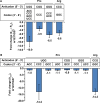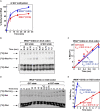Loss of N1-methylation of G37 in tRNA induces ribosome stalling and reprograms gene expression
- PMID: 34382933
- PMCID: PMC8384417
- DOI: 10.7554/eLife.70619
Loss of N1-methylation of G37 in tRNA induces ribosome stalling and reprograms gene expression
Abstract
N1-methylation of G37 is required for a subset of tRNAs to maintain the translational reading-frame. While loss of m1G37 increases ribosomal +1 frameshifting, whether it incurs additional translational defects is unknown. Here, we address this question by applying ribosome profiling to gain a genome-wide view of the effects of m1G37 deficiency on protein synthesis. Using E coli as a model, we show that m1G37 deficiency induces ribosome stalling at codons that are normally translated by m1G37-containing tRNAs. Stalling occurs during decoding of affected codons at the ribosomal A site, indicating a distinct mechanism than that of +1 frameshifting, which occurs after the affected codons leave the A site. Enzyme- and cell-based assays show that m1G37 deficiency reduces tRNA aminoacylation and in some cases peptide-bond formation. We observe changes of gene expression in m1G37 deficiency similar to those in the stringent response that is typically induced by deficiency of amino acids. This work demonstrates a previously unrecognized function of m1G37 that emphasizes its role throughout the entire elongation cycle of protein synthesis, providing new insight into its essentiality for bacterial growth and survival.
Keywords: E. coli; TrmD; infectious disease; m1G37-tRNA; microbiology; ribosome pausing; ribosome profling; stringent response.
© 2021, Masuda et al.
Conflict of interest statement
IM, JH, TC, SM, FM, HG, AB, YH No competing interests declared
Figures









References
Publication types
MeSH terms
Substances
Associated data
- Actions
Grants and funding
LinkOut - more resources
Full Text Sources
Other Literature Sources
Molecular Biology Databases

